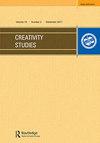THE ETHOS OF THE AUTEUR AS FATHER OF THE FILM CRAFT – ON MASCULINITY, CREATIVITY AND THE ART OF FILMMAKING
Q1 Social Sciences
引用次数: 3
Abstract
Research of the world of cinema often deals with the manner in which movies replicate the social balance of power, creating a symbolic order based on an essentially masculine world-view that puts the man at its center. The price women pay for this phallocentric approach – their persistent objectification in cinema, and the very small number of female screenwriters and directors – has become a much-discussed topic in contemporary research. However, the question of the price paid in the male artistic creation process has yet to receive the attention it deserves. This qualitative study addresses the lacuna in contemporary research, with reference to three metafictional films that focus on male directors, as an auteur for whom cinema is the pivotal center of their being: the Israeli film Peaches and Cream (2019, directed by Gur Bentwich), the Spanish film Pain and Glory (in Spanish: Dolor y gloria, 2019, directed by Pedro Almodóvar), and American film All That Jazz (1979, directed by Bob Fosse). They all are viewed as having an affinity with the ancient Greek comparison of male creativity with female procreativity, which is still reflected in contemporary studies. The films paint a picture of the male creative process shadowed by a sense of danger and loss of self. All three expose the feelings of anxiety inherent in film directors’ work, and the possible resultant breakdown, not only in an emotional sense but in a real, potentially fatal physical or medical sense as well. In all three movies, the director conceives of his ability to restore his sense of inner wholeness and male identity in a manner that contradicts the conventional balance of power, while customary power-relations are revealed as another road to loss of identity and sense of self. Each of the films ties the director’s ability to renew his sense of personal wholeness to developing a relationship with his surroundings, facilitated by audience appreciation, critical praise, or empathy from those close to him – all of which reinforce his feeling of belonging and significance. Without these aspects, the “absolute artist”, whose life revolves around his art, is shown to be at death’s door, whether symbolically or in reality.作为电影工艺之父的导演的气质-关于男子气概,创造力和电影制作艺术
对电影世界的研究通常涉及电影复制社会力量平衡的方式,创造了一种基于男性世界观的象征秩序,这种世界观以男性为中心。女性为这种以阴茎为中心的方法付出的代价——她们在电影中的持续物化,以及极少数的女性编剧和导演——已经成为当代研究中备受讨论的话题。然而,男性艺术创作过程中所付出的代价问题尚未得到应有的重视。这项定性研究解决了当代研究中的空白,参考了三部以男性导演为中心的元虚构电影:以色列电影《桃子与奶油》(2019年,Gur Bentwich执导)、西班牙电影《痛苦与荣耀》(西班牙语:Dolor y gloria,2019年,Pedro Almodóvar执导),以及美国电影《All That Jazz》(1979年,鲍勃·福斯执导)。他们都被认为与古希腊将男性创造力与女性生育能力进行比较有密切关系,这一点在当代研究中仍有反映。这些电影描绘了男性在危险感和自我丧失的阴影下的创作过程。这三者都暴露了电影导演作品中固有的焦虑感,以及由此可能导致的崩溃,不仅在情感上,而且在真实的、潜在的致命的身体或医学意义上。在这三部电影中,导演都认为自己有能力以一种与传统权力平衡相矛盾的方式恢复内心的完整感和男性身份,而传统的权力关系则被揭示为另一条失去身份和自我意识的道路。每一部电影都将导演更新个人完整感的能力与发展与周围环境的关系联系在一起,观众的欣赏、批判性的赞扬或亲近他的人的同情都会促进这种关系的发展,所有这些都会增强他的归属感和意义。如果没有这些方面,“绝对艺术家”的生活围绕着他的艺术,无论是象征性的还是现实中的,都会被视为濒临死亡。
本文章由计算机程序翻译,如有差异,请以英文原文为准。
求助全文
约1分钟内获得全文
求助全文
来源期刊

Creativity Studies
Social Sciences-Cultural Studies
CiteScore
3.20
自引率
0.00%
发文量
38
审稿时长
15 weeks
期刊介绍:
Creativity Studies accepts original research articles with a focus on communication within the creative society. The journal welcomes contributions from scholars from diverse disciplines such as philosophy, sociology, history, political, communication and information sciences. Creativity Studies also publishes survey papers and descriptions of academic events in this area. The journal issues will be organized around different issues on creativity.
 求助内容:
求助内容: 应助结果提醒方式:
应助结果提醒方式:


